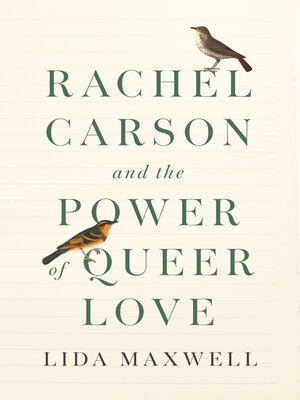
Sign up to save your library
With an OverDrive account, you can save your favorite libraries for at-a-glance information about availability. Find out more about OverDrive accounts.
Find this title in Libby, the library reading app by OverDrive.



Search for a digital library with this title
Title found at these libraries:
| Library Name | Distance |
|---|---|
| Loading... |
How Silent Spring stands as a monument to a unique, loving relationship between Rachel Carson and Dorothy Freeman, and how such love underpins a new environmental politics
After the success of her first bestseller, The Sea Around Us, Rachel Carson settled in Southport, Maine. The married couple Dorothy and Stanley Freeman had a cottage nearby, and the trio quickly became friends. Their extensive and evocative correspondence shows that Dorothy and Rachel did something more: they fell in love.
In this moving new book, Lida Maxwell explores their letters to reveal how Carson's masterpiece, Silent Spring, grew from the love these women shared for their wild surroundings and, vitally and increasingly, for each other. Carson had already demonstrated a profound environmental awareness by the time she purchased her home in Maine; Maxwell proposes that it took her love for Dorothy to open up a more powerful space for critique. As their love unsettled their heteronormative ideas of bourgeois life, it enabled Carson to develop an increasingly critical view of capitalism and its effects on nonhuman nature and human lives alike, and it was this evolution that made the advocacy of Silent Spring possible.
In Rachel Carson and the Power of Queer Love, Silent Spring's exposé of the dangerous and loveless exhaustion of nature for capitalism's ends is set in bold relief against the lovers' correspondence, in which we see the path toward a more loving use of nature and a transformative political desire that, Maxwell argues, should inform our approach to contemporary environmental crises.






